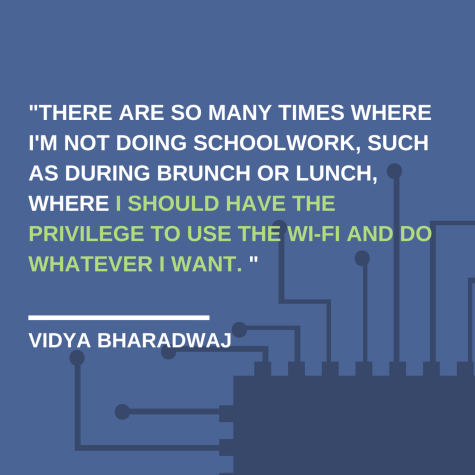Deconstructing Securly
Investigating the incentives and impacts behind implementing the web filter at FUHSD
Graphic | Lauren Chuu
October 7, 2022
The recent addition of a Securly web filtering certificate to the school Wi-Fi system sparked controversy among MVHS students due to privacy concerns. The home support page of the Securly website states that the certificate collects school-issued email address, public IP address, websites visited, searched terms, YouTube videos and social media posts on monitored devices.
FUHSD sent an email to students on Aug. 12 instructing students to download the web-filtering software in order to use FUHSD Wi-Fi. Superintendent Graham Clark explained that Securly is essential for the district to qualify for Federal E-rate funds which grant a 40% to 60% discount on internet, switches and servers. FUHSD qualifies for these funds with Securly by meeting stipulations to provide monitoring services, filtering services and free computer and internet access per the Children’s Internet Protection Act.
In another email, FUHSD Chief Technology Officer Scott Harrington confirmed the information and explained that the reason for the transition to Securly was to allow the district to monitor district-owned devices off campus, improving online safety by preventing students from “accessing malicious content.”
Although senior Vidya Bharadwaj understands the idea behind implementing Securly, they are unable to reconcile that with the fact that her personal computer is being monitored while she is accessing school Wi-Fi.
“[I wish we could] go back to how it was a year ago when everyone wasn’t complaining about the web filter and there were no issues at all,” Bharadwaj said. “For Chromebooks, there can be a web filter because the school owns [them]. But on your own personal computer, I don’t think anything should be restricted and [everyone] should have the privilege to access the [full] internet [at school].”
Meanwhile, sophomore Jerry Fu believes the certificate mostly benefits students by encouraging productivity, as he sometimes finds the internet to be distracting. However, for students who are already efficient, he sees how Securly could be restricting for them.
Since sophomore Peter Chen was already using a school Chromebook which he says already had a lot of restrictions in place, he wasn’t significantly impacted when the Securly web filter was put into use. However, similar to Fu, Chen states that the web filter has caused inconveniences during classes, sharing that “when people were searching up vocabulary for [his] literature class, there were [websites] that were blocked that [weren’t] inappropriate.”
Likewise, Bharadwaj started using school Chromebooks in class to avoid downloading Securly on her personal device, but explains that “it hasn’t been the most convenient [because the Chromebooks are] very laggy.” They also felt frustrated during class when the web filter blocked Canva, a website used for graphic designing.
Chen and Bharadwaj agree that even after class, the web filter restricts certain websites or apps they want to use. Chen wishes Discord, a text messaging and voice calling app, was unblocked on internet browsers because it is a way for “people to communicate with others” between classes. Clark, however, notes that the reason for the blocking of Discord was due to the capability of third-party users to interact with students under false pretenses. Still, Bharadwaj similarly believes that there should be fewer Wi-Fi restrictions outside of class.
“[The school’s] point of view of ‘[students] should be doing schoolwork, therefore [the school] should be able to see what [students] are doing’ is flawed,” Bharadwaj said. “There are so many times where I’m not doing schoolwork, such as during brunch or lunch, where I should have the privilege to use the Wi-Fi and [still] do whatever I want.”

Following the implementation of the new software, questions regarding the ethicality and the extent of the surveillance have risen among some students. Bharadwaj expresses her discontent, saying that she does not “understand why [the school] has to see what [she is] searching up.”
Despite the personal implications that Bharadwaj feels are present with Securly, Harrington maintains that filtering aligns with the district’s standards of appropriate use of technology and prevents students from accessing potentially malicious content. He also clarifies that personal devices are not filtered off campus.
“There’s a dangerous world out there on the internet and so the filtering system [helps our] efforts [in] security,” Harrington said in an FUHSD Board Meeting on Thursday, Sept. 22. “Clearly, the internet is a mixed bag: there’s a lot to be gained [on the internet] but in [an] educational environment, [there] are also a lot of distractions. I think our approach to filtering is to do the minimal amount that we can and still have successful outcomes.”




















